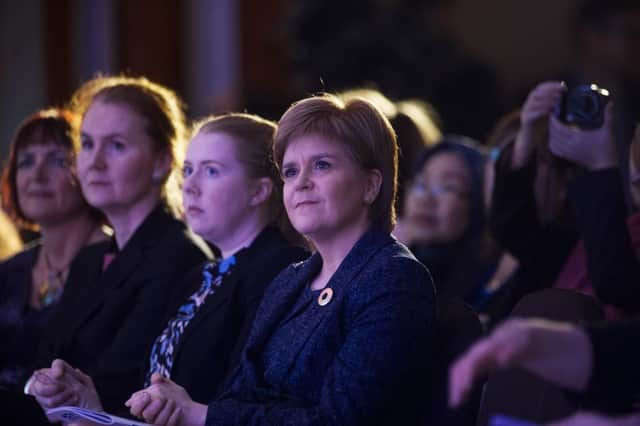Tom Peterkin: Nicola Sturgeon's fingers crossed on EU vote


There seemed a certain irony that Sturgeon should argue that a snap EU plebiscite would deny pro-Europe campaigners enough time to make the “big picture” case for remaining in a political union (the EU).
It was, after all, Sturgeon and the SNP who engineered an interminable two-year Scottish independence campaign in their unsuccessful attempt to quit another union (the UK).
Advertisement
Hide AdAdvertisement
Hide AdSturgeon also warned the In EU campaign against adopting the negative approach she associates with those who argued against Scottish independence. Of course, it does not fit the SNP’s narrative to acknowledge that it was the “negative” Better Together campaign that ultimately won on 18 September, 2014.
In a black and white SNP world, where the Scottish referendum is characterised as the forces of fear triumphing over a vision of hope, there is not much room for nuance. For the In campaign, pointing out the economic consequences of leaving the EU is a legitimate strategy. Nevertheless one of the real challenges facing Cameron is that it is growing increasingly difficult to envisage running an In campaign on anything other than negative arguments about the risks of leaving.
In the south of England, the EU’s association with rising immigration makes a positive campaign challenging. As does the economic chaos associated with the eurozone.
In this context, it is easy to imagine the SNP taking the In campaign to task for its downbeat tone, despite the party’s avowed position that it wants the UK to remain in the EU. Furthermore, there will be conspiracy theorists who believe that the SNP will be only too willing to undermine the In campaign, because doing so suits its own agenda for Scottish independence.
Sturgeon and others have said that a second Scottish referendum would be triggered if Scotland is forced out of Europe against its will as a result of a majority of people voting for Brexit south of the Border. Sturgeon actually addressed that point at her press briefing. “I’m not sitting here privately hoping that the UK will come out of Europe,” she said.
Much as it might disappoint the conspiracy theorists, one suspects that her comment can be taken at face value. With the price of oil plummeting to $30 per barrel, the economic case for independence has taken a hammering.
There is also the thorny issue of currency, a conundrum that was addressed by Alex Salmond’s former adviser, Kevin Pringle, in an article last year.
Pringle – who interestingly enough has just been appointed as a key strategist for the Stronger in Europe campaign in Scotland – wrote that Scottish independence would be a “harder sell” if another referendum was held while the UK was in the process of leaving Europe.
Advertisement
Hide AdAdvertisement
Hide AdHe warned that this would create an “added layer of complexity” to the key issue of an independent Scotland’s ability to share the pound with the rest of the UK as it stood on the verge of becoming a non-EU country. On that basis Sturgeon may be crossing her fingers almost as tightly as Cameron.